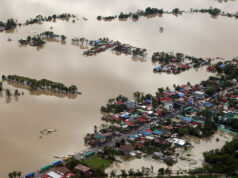THE PLANNED Overseas Filipino Bank will be established in April, after original plans to set it up in January, as the business plan is being reconfigured to make it a lending institution.
Land Bank of the Philippines (LandBank) President and Chief Executive Officer Alex V. Buenaventura said the Bangko Sentral ng Pilipinas (BSP) is requiring the bank to offer loans.
“We have to revise the business plan. We have to have loans also. To be a bank you have to accept deposits and you have to lend,” Mr. Buenaventura told reporters on Thursday in a chance interview at the Finance department headquarters.
The Overseas Filipino Bank, formerly Philippine Postal Savings Bank, was originally conceived as a remittance marketing arm for LandBank – the terms under which Postal Bank was acquired in a transaction authorized by President Rodrigo R. Duterte via Executive Order No. 44 in September.
“I tried to think out of the box to make it easier and faster. We were only supposed to outsource our loans to LandBank, and then use LandBank’s 423 branches to service the beneficiaries,” Mr. Buenaventura said.
He said that the revised business model will be submitted this week to the BSP, while the acquisition plan will be filed with the Philippine Competition Commission, with three months expected for approval.
The Securities and Exchange Commission will then be asked to approve amendments to LandBank’s articles of incorporation and bylaws – which will take another three months.
“It’s looking like April is the new target,” he said.
He added that the Overseas Filipino Bank’s authorized capital will remain at P1 billion, with P300 million to be offered to overseas Filipinos as preferred shares, and P700 million worth of common shares.
Mr. Buenaventura said that the foreigners can open accounts with the bank, as long as the branches outside the Philippines carry out the know-your-customer process.
Loans will be restricted for use by Philippine-based beneficiaries, he said.
The bank was a campaign promise of Mr. Duterte to Filipinos based in Saudi Arabia, who account for 40% of all overseas Filipino workers. – Elijah Joseph C. Tubayan



